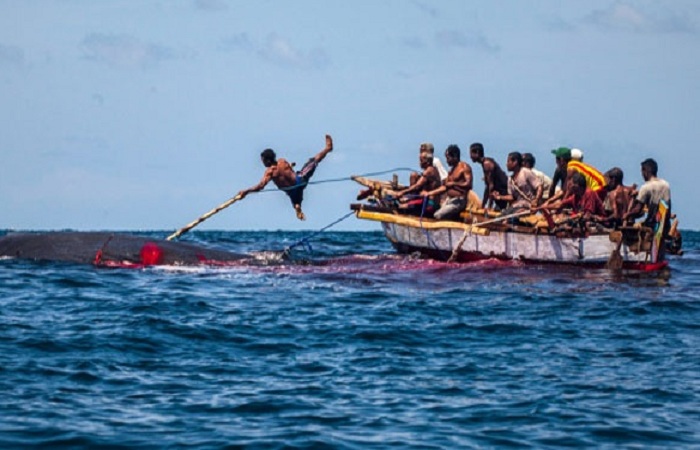Larantuka, Vox NTT– Calling Lembata without Lamalera seems incomplete.
The fishing village in the south of Lembata Island which is located at 123.5 east longitude and 8.5 south latitude is the first entrance to the development of Christianity.
Without obvious data to this day two priests from the Dominican Order happened to be stranded on the beach of Lamalera. About what they did was not clear about the story.
On June 8-9, 1886, history recorded that 125 people in Lamalera were baptized by two Jesuit priests.
The bathing sacraments received by the people at Lamalera at that time became the history of the founding of the Christian community on Lembata Island.
1917, when Jesuit missionaries decided to surrender the mission of the Lesser Sunda Islands to the Congregation of the Society of the Word of God (SVD).
A priest who previously served in Togo-Africa then turned the mission of preaching to Lamalera.
This priest’s name is Father Bernhard Bode, SVD. Born in Germany Bilhausen on August 20, 1885.
The little Bode who aspired to become a priest then continued to knit the path of his call until he was ordained a priest in the SVD congregation on September 29, 1910.
The term of office in Togo for five years ended due to the situation of World War I in 1914. Bode whose spirit of mission was again fiery and then appointed to be a missionary in Flores.
June 20, 1920 Father Bernhard Bode arrives in Ende.
From Ende, Bode sailed to Lela and then picked up with a horse to continue the trip to Larantuka.
Bode arrived and was officially accepted by Fr. Chancellor Jhon Bouma SVD on 1 August 1920.
In Lamalera itself the word had spread that there would be a priest living and settling in Lamalera.
The joy of the people was unstoppable to immediately meet the priest after being left behind by the Jesuit mission.
That day was September 25, 1920 Bode arrived in Lamalera. Tuan tite, tuan tite(our pastor, our pastor) the people shouted when welcoming Father Bode.
Even though he did not understand the language spoken by the people, Bode understood the expression of joy from the face indicating that he was accepted.
The first work began. Mr. Bode then initiated the construction of a church and a rectory house.
Not only in Lamalera but penetrated to almost all of the missionary service sites in Lembata. He respects everyone. Especially also to ata molang (the term for village elders who are believed to be shamans, prayers and also village guards).
His acquaintance with the ata molang made him understand that in fact ata molang is also part of the spirit of unifying the teachings of God the Organizer of Life to live in harmony with nature.
This closeness is also what makes Bode understand that the people of Lamalera since long time a go had a time-determination tradition to catch whales.
Bode then concluded that Lamalera and whales could not be separated. Both are rigging that clearly illustrates relationships between people and also the highest form.
According to Pater Bode, whales catching for Lamalera people are very high in social value and very large for them on the south coast of Lembata Island.
Whaling for the people of Lamalera is also a sign of being committed to show the special responsibility of fellow Lamalera people to build a shared livelihood.
To all Lamalera people the spirit to catch a whale before going to the vast ocean must be started by having clean heart. Christian characteristics were included in the tradition of whaling.
The presence of lefa / sea mass at the beginning of May is evidence that Bode is knitting strongly the life of faith of the Lamalera people.
The self and all of his preaching work to all corners of Lembata are a sign that he is in his way, his touch, his greetings and his missionary work touching models of contextual theology.
He understands that whatever he teaches must be touching. If then Stephen B. Bevans, writes that theology must be contextual because cultural differences are closely attached to human nature, SVD Father Bernhard Bode has carried out his missionary work perfectly. Glorious.
He became a pastor of all people in Lembata. About the story of his closeness to everyone and his preaching work in Lembata, Bode writes;
“I became a friend of the fishing population of Lamalera in order to maintain life. So I approach them to talk to them and love them, and instead, they can open their hearts and love me.”
If now Lamalera and the tradition of whaling is set by the Ministry of Tourism to be an Intangible Cultural Heritage, then that is certainly the Bernhard Bode prayer from heaven, the house of eternity. He has loved Lamalera and Lembata to the fullest.
Author: Engky Ola Sura
Editor: Rini Kartini/HOS
Reading source:
1. Pater Bernhard Bode SVD Rasul Pulau Lembata by Pater Alex Beding SVD, Lamalera printing, 2008
2. Model-model Teologi Kontekstual by Stephen B. Be







